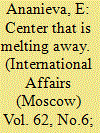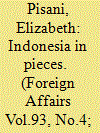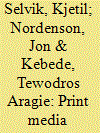|
|
|
Sort Order |
|
|
|
Items / Page
|
|
|
|
|
|
|
| Srl | Item |
| 1 |
ID:
149711


|
|
|
|
|
| Summary/Abstract |
THE EU REFERENDUM exposed a deep-cutting split in British society along the regional, age, social, educational, and, on the whole, class lines (the latter forgotten in the years of economic prosperity of postindustrial society).1 David Cameron organized the referendum in a hope to keep the Conservative Party united, to achieve reconciliation on the nationwide scale and bury the issue for at least another generation. The referendum, however, revealed the strengthening and so far latent trends of the last twenty years, which cropped up as the consistently mounting success of the United Kingdom Independence Party (UKIP) at the local, parliamentary and European parliamentary elections. In 2015, the "unfair" majority system left UKIP with one seat in the Commons (the system of proportional representation would have brought over 60 UKIP deputies to Westminster that corresponded to 12.6% of the gained votes).2
|
|
|
|
|
|
|
|
|
|
|
|
|
|
|
|
| 2 |
ID:
129302


|
|
|
| 3 |
ID:
132162


|
|
|
|
|
| Summary/Abstract |
In April, voters in Indonesia's parliamentary elections shocked many observers, confounded most pollsters, and seemed to set back their own long-term interests by failing to deliver a massive victory to the main opposition party, the Indonesian Democratic Party of Struggle. Under the country's complex electoral rules, a party must win 25 percent of the popular vote (or 20 percent of the seats in parliament) before it can formally nominate a presidential candidate. Polls had predicted that the Democratic Party of Struggle would win up to 30 percent of the vote, largely thanks to the massive popularity of the politician the party announced would represent it in the presidential election: Joko Widodo, the governor of Jakarta, who was expected to win that race handily. But his party managed to eke out only 19 percent -- more than any of the 11 other parties in the running, but not enough to cross the threshold. And so Jokowi, as he is widely known, will have to form a coalition to run for president, meaning that if he manages to take the helm of the world's third-largest democracy in July, he'll do so with little power and representing an alliance with no clear platform.
|
|
|
|
|
|
|
|
|
|
|
|
|
|
|
|
| 4 |
ID:
137840


|
|
|
|
|
| Summary/Abstract |
The July 2012 parliamentary election in Libya was free and fair. Nonetheless, the election exacerbated various local, tribal, and religious cleavages. The National Transitional Council's policy of appeasement successfully averted widespread armed conflict, yet it inadvertently derailed Libya's future constitutional process. This article surveys the main scholarly paradigms for analyzing both Libya after the fall of Mu'ammar al-Qadhafi and the role of elections in societies in transition. It concludes that the outcome of the 2012 Libyan election calls into question the ability of post-conflict elections to function as tools of democratization or as mechanisms to unify social fissures, especially in societies lacking in formal institutions.
|
|
|
|
|
|
|
|
|
|
|
|
|
|
|
|
| 5 |
ID:
137844


|
|
|
|
|
| Summary/Abstract |
The article discusses the political effect of print media liberalization in Kuwait based on content analysis of Arabic language newspapers in the 2009 parliamentary election. The analysis found no systematic favoring of pro-government candidates in electoral coverage, but did find a statistically significant bias for candidates from the ruling, non-Bedouin hadari class, at the expense of the Bedouin tribal population. This article points to there being structural obstacles to democracy in Kuwait that cannot be overcome only by the liberalization of the press through legislation.
|
|
|
|
|
|
|
|
|
|
|
|
|
|
|
|
|
|
|
|
|